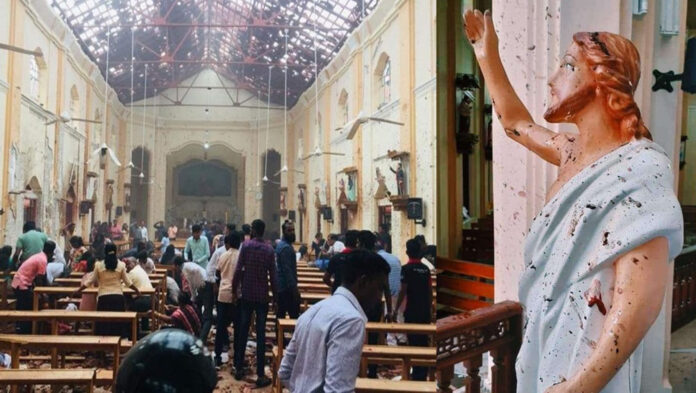This is perhaps the darkest period of Christian persecution since the early centuries when men and women, young and old were thrown to lions, burnt at stakes, cut apart, maimed, ostracised and chased away – all because they believed in Jesus Christ who rose from the dead. They believed that passion and death are followed by a sure resurrection, but their persecutors didn’t know it.
I was about to write something about the persecution targeted at Christians across the globe. Before beginning to write this, I wanted to know what the Blessed Virgin has to tell us about persecution for the sake of faith. With this prayer I opened ‘To the Priests, Our Lady’s beloved Sons’ (The Blue Book). The page I opened at random was that of message number 350 dated 18th April 1987. It happened to be the Holy Saturday of the year. Let us listen to our Mother’s words;
“This is the day of my great sorrow.
It is the only day through which I lived with Jesus dead……
Time stopped for Me in that moment.Then began My continuous vigil, with an unceasing prayer which accompanied the rhythm of the passing of the hours, in a sure hope which reached even to entering the gate of Heaven, in a deep and intense suffering…..
It is the Saturday of the great rest.
It is the Saturday of the great silence.
It is the Saturday of my great sorrow.
It is the only day on which the Mother remains alone, crucified and imploring, full of trust and faithful, weighed down beneath the weight of her suffering”.
It was a Sabbath of great sorrow for Mary who had to spend the first day in 33 years without her son. It was a Sabbath of rest, silence and loneliness. It was a Sabbath of prayer. It was the culmination of what Simeon foretold as the ‘sword piercing her heart’. Then Mary’s only consolation was the hope that her son will conquer even the last enemy called death and raise from the tomb. That Sabbath was the last day of her persecution. The dawn after that Sabbath broke with the ‘good news of great joy for all the people’. He is risen. Hallelujah!
On the last day of her great sorrow our Mother was alone. We too are alone. In the final hours preceding the glorious resurrection of Jesus Christ, our Mother was deep in prayer. We too should be in prayer in these final hours when we look forward to the dawn of the Lord’s return in glory. The sword that pierced her heart was yet to be removed. We too face the sword every day. She was silent all through the moments of excruciating pain and suffering that she shared with her son. Jesus Christ wants us also to be silent in times of persecution.
Having said this, do we really understand the extent and gravity of Christian persecution happening around us? To have any meaningful discussion on this topic, first we should know how severe the persecution of the early centuries was. Christians were persecuted by Jews, when their numbers were a minuscule minority in the total population. By AD 100 the percentage of Christians in the Roman empire was less than one percent. Even by AD 250 it was at a meagre two percent only. Yet they persecuted Christians.
Iraq, Syria, Turkey, Lebanon, Egypt, Jordan, Sudan, Tunisia, Morocco, Libya, Algeria and a host of other countries now identified as Muslim countries were once dominated by Christians. It was no reason for the Islamists to systematically eliminate the Christian presence from these lands.
France and Spain are typically Christian countries, but some of the fiercest Christian persecutions took place in these countries. When we read in the history that around 20000 catholic priests were forced to leave priesthood and another 6000 priests were forced to marry against their wishes, think about how the French Republic hunted Christians! Thousands of priests had to leave the country and a few thousand others were simply executed. Large scale desecration of churches and removal of crucifixes and statues culminated in the installation of the Goddess of Reason in Notre Dame cathedral. It happened in a country with more than 95% Christians at that time! If France could do it, why should Spain lag behind? In one single night during 1936, fifty churches were destroyed in Spain. At the end of those dark days, Barcelona, which boasted 57 churches till a few days ago, couldn’t save any of them except their famed cathedral from the onslaught. .
Japan banned christianity in 1614. Within the next quarter century almost thirty seven thousand men and women were killed for the sole reason that they believed in Jesus Christ. For more than two centuries the Church in Japan was living underground without priests and sacraments. Chinese Christians are accustomed to worship in hiding even after the much publicised Sino- Vatican secret deal. India, the land of many religions finds itself in the unenviable situation of being placed in the list of countries with highest incidence of Christian persecution. Riots targeting Christians were orchestrated by Hindu fundamentalists on many occasions. In the horrible anti-Christian riot and arson in Kandhamal, 54000 Christians were left homeless, more than a hundred killed, 600 villages affected, and hundreds of churches and places of worship were destroyed. In the year 2019 alone there were 328 attacks against Christians reported from India.
The common thread connecting China, North Korea, Iran, Bangladesh, Chad, Indonesia, Malaysia, Nigeria, Saudi Arabia, Russia, Madagascar, Albania, Kosovo, Bulgaria and Turkey is that they are all on the same page when it comes to persecuting Christians. The common thread connecting the Christians of early centuries and the Christians of our times is also the fact that both are subjected to persecution at the hands of others. And the common thread connecting the past twenty centuries is that for reason or no reason Christians are persecuted. They are persecuted in places where they are a minority as well as in places where they are the majority. They are persecuted in democracies as well as autocracies. Their fate is the same under communist rule and islamic rule. Their persecutors think the same way and employ the same methods across continents. From North Korea to Cuba, from Madagascar to Russia, from India to Canada, from France to US the modus operandi is the same. Often we fail to understand the various forms, some covert and some overt, of persecution systematically planned against Christians. This is why many people erroneously think that in the western hemisphere, where the dominant religion is Christianity, they are not subjected to any kind of discrimination or persecution. Nothing is far from the truth. In fact, the biggest challenge to Christianity in these days is the ultra-secular, left leaning, liberal governments and their anti-christian legislations framed to distance people from Jesus Christ and Christianity.
Now let me ask you a straight question. Followers of which religion are persecuted the most in this world? It is Christians! But if you are a regular patron of mainstream media, chances are that you might get a different view! Almost 80% of persecution for the cause of faith is directed against Christians who comprise less than 32% of world population. This statistics is relevant not for the current period alone. It has been so during most part of the history since Christianity was established.
Why do Christians are singled out for persecution all over the world? To know the reason first we should know who is persecuting Christians. In Muslim countries it is the Islamic fundamentalists. In communist countries it is the government. In Hindu countries, it is Hindu fundamentalists. In Budhist countries, it is Budhist fundamentalists. And in Christian countries it is the secular, atheistic, liberal communities. Here many will find it difficult to trace a common intention between these fundamentally diverse groups of persecutors that range from religious fundamentalists to communists and secular liberals. A common thread connecting all of them may not be visible at first sight. But it is there. It is their hatred towards a person who sacrificed his life as ransom for the whole humankind, and who rose from the dead, and who is sure to come again to judge the living and the dead. They fear this person. But we love this person. Hence the persecution.
In most of the countries where Christians are persecuted, the persecutors get tacit support from the governments. Many countries, including the so called developed, secular, democratic countries have legislations making it difficult for Christians to practise their religion freely. Across countries we see that the entire government machinery including the legislature, executive and judiciary are already hijacked by anti-christian forces. They make laws against the basic tenets of Christianity. Remember legislations enacted for legalising the murder of unborn children and laws restricting public worship. Remember laws promoting all kinds of abominations in the name of freedom. Understand that many countries have barbaric laws where conversion to Christianity is rewarded with capital punishment. Remember the restrictions inflicted upon the Church to run educational institutions and the laws forcing participation of medical professionals in sinful acts against their conscience. Remember the compulsion on business firms to collude in the production, distribution and sale of goods and services with patently anti-christian themes.
There is only one reason for persecuting Christians. It is their belief in Jesus Christ. Situations, locations and contexts may change. But understand that if you are persecuted for being a Christian, the one and only reason is that you believe in somebody whom your persecutors could not believe.
Jeremiah was thrown into the cistern because he warned the people about the impending captivity (Jer. 38: 1-6). Daniel was thrown into the lion’s den because he was not ready to worship false gods (Dan. 14:23-32). Eleazar was killed because he resisted eating forbidden food (2 Macc. 6:18-31). Stephen was stoned to death because he proclaimed the gospel of Jesus Christ ( Acts 7:58). Peter and Paul were martyred for preaching about the crucified Jesus. John was sent to Patmos because of the Word of God and the testimony of Jesus (Rev 1:9).
What should be our attitude towards persecution at the hands of our enemies? Peter summarises the essential Christian response to persecution in these words. ‘Beloved, do not be surprised at the fiery ordeal that is taking place among you to test you, as though something strange were happening to you. But rejoice insofar as you are sharing Christ’s sufferings, so that you may also be glad and shout for joy when his glory is revealed. If you are reviled for the name of Christ, you are blessed, because the spirit of glory, which is the Spirit of God is resting on you’ (1 Pet. 4:12-14). Peter warns us to be prepared for facing persecution at any time. A Christian should not see persecution as something strange. For him it is normal! Unlike others, Christians are exhorted to rejoice when they are persecuted. Beginning Stephen, we have a long list of saints and martyrs who rejoiced when they were persecuted for the name of Jesus. What Peter said was not a mere sermon for us; while writing these lines, he should have the joy they experienced when the Jews flogged them. ‘As they (Peter and other apostles) left the council, they rejoiced that they were considered worthy to suffer dishonor for the sake of the (Jesus’) name (Acts 5:41).
Jesus himself has warned us about a time when the enemies will torture us. ‘ Then they will hand you over to be tortured and will put you to death, and you will be hated by all nations because of my name’ (Mt.24:9). The sole reason for others persecuting us is the name of Jesus which we proclaim. If we understand persecution as the natural consequence of believing in Christ and proclaiming the salvation which he offers, it is easy to withstand the tortures directed against us. The world is divided into two camps. It is either for Christ or against Christ. We have to select one of them. If we select the Lord’s camp, then we get persecution too as a bonus. It is the unchanging word of the Lord; ‘For at that time there will be great suffering, such as has not been from the beginning of the world until now, no and never will be’ (Mt 24:21). Peter equates the ferocity of our enemy with that of a roaring lion. ‘Like a roaring lion your adversary the devil prowls around looking for someone to devour’ (1 Pet 5:8).
Though persecution of Christians has been a continuing story through centuries, The Holy Bible warns us about a particular time period in history when the ‘beast rising out of the sea’ being allowed to ‘make war on the saints and to conquer them’ (Rev 13:1-7). It is all happening under the Divine plan. This is why Peter tells us not to think that something strange is happening to us. If God has in His infinite wisdom, permitted the devil to afflict mankind in an unparalleled way, He has also set in place a plan to protect His children from the clutches of the devil. But we cannot avoid persecution. What we can implore is to limit the days of persecution as promised by Jesus. ‘And if those days had not been cut short, no one would be saved; but for the sake of the elect those days will be cut short’ (Mt 24:22).
The share of a true Christian is nothing but ‘the bread of adversity and the water of affliction’ (Isa 30:20). But his hope is in Lord’s promise; ‘Your teacher will not hide himself anymore, but your eyes shall see your teacher’ (Isa 30:20). But to see him we should take our eyes from this world and look into heaven. In the moments of cruel persecution, Stephen gazed into heaven, and he did indeed see his Teacher.
Let us pray for the grace to joyfully accept the cup of persecution. Let us also pray for the grace to be able to gaze into heaven to see the glory of the Lord so as to make us bold enough to withstand the tribulation.





















